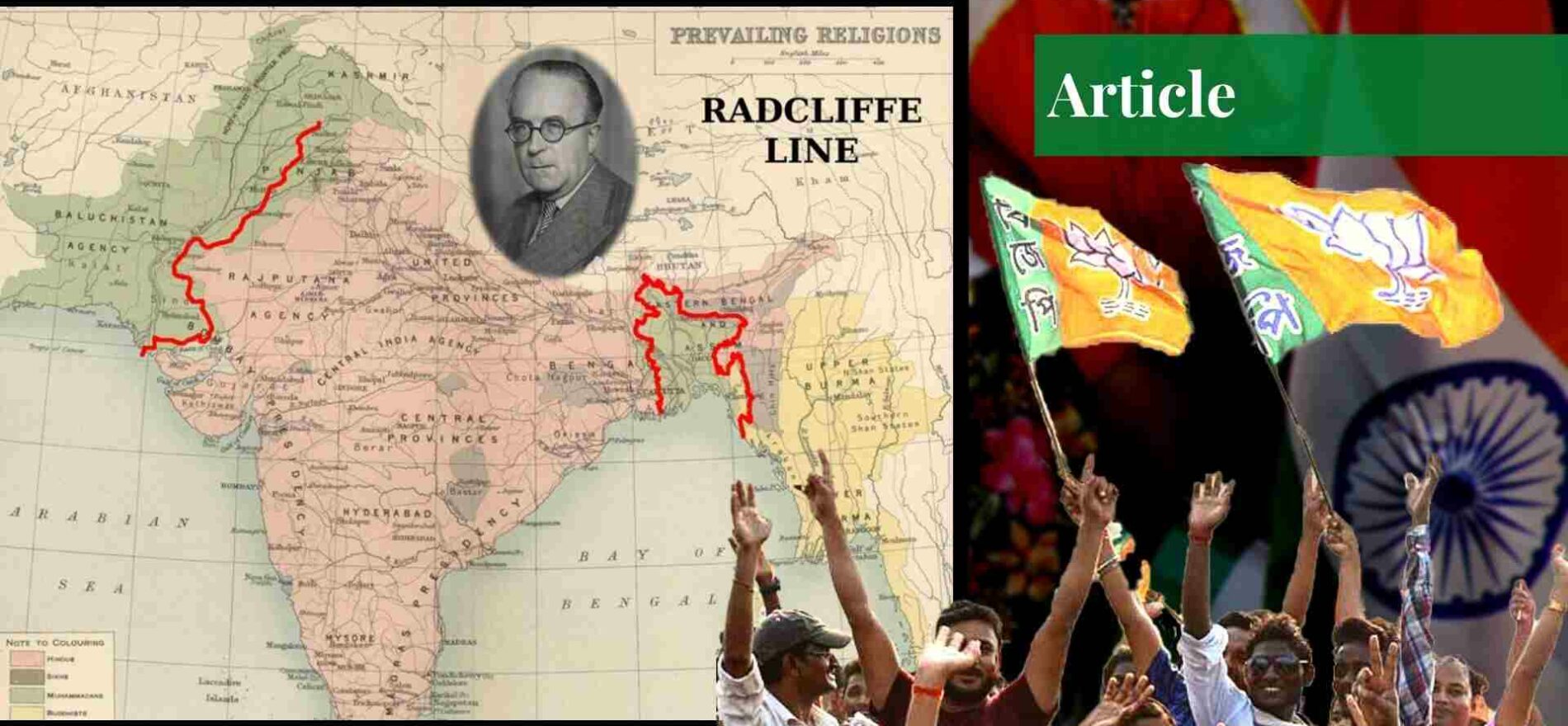Mr. Noman Waheed is a graduate of NUST.
Introduction
Had Cyril Radcliffe not consciously engineered India’s geographic contiguity with Jammu and Kashmir, the course of India-Pakistan history would have been much different. Larry Collins and Dominique Lapierre in their book, Freedom at Midnight, rightly pointed out that Radcliffe’s pencil had providentially created Kashmir’s contiguity with India by delivering the town of Gurdaspur despite its large Muslim population, and thus ensued Indo-Pak dispute over Kashmir.
In fact, the unfortunate Kashmiris have been bearing the brunt of this politically-motivated decision since the time of the Boundary Commission Plan. Revocation of Article 370 of the Indian Constitution and the resulting promulgation of a new domicile law (Jammu and Kashmir Grant of Domicile Certificates (Procedure) Rules, 2020) are the repercussions of what Jawaharlal Nehru and Krishna Menon conspired during a secret meeting with the last viceroy of British India, Lord Mountbatten, at Shimla in May 1947.
If there was no secret meeting, the 3rd June Plan and the resulting status of Kashmir would have been quite different from what Quaid-e-Azam described as the ‘moth-eaten’ plan. Regrettably, the present-day demographic changes in Kashmir are the materialization of that moth-eaten plan. Under the guise of integrating Kashmir with India, the BJP-led government of India has turned the valley into an ‘open-air prison’, as The Diplomat put it.
Since the abrogation of Article 370, which granted special status to the state of Jammu and Kashmir, India has been ferociously on its undeterred way of turning the valley’s majority into a minority.
Grant of new domicile certificates to non-Kashmiris, the appointment of Lieutenant Governor as Chief Administrator of Indian Illegally Occupied Jammu and Kashmir (IOJK), maltreatment of indigenous population of IOJK (human rights abuses, curfews, media blackouts, communication blockade, torture, and rape) are the all-evident manifestations of India’s barbarism on the innocent Kashmiris.
A Brief History of Kashmir
Before expounding India’s high-handedness on the Kashmiris, it is imperative to shed a light upon Kashmir’s history that brought the region to this precarious situation. The state of Kashmir was purchased by Gulab Singh after the 2nd Anglo-Sikh war from the cash-strapped English East India Company under the infamous deal of Rs.75 lacs (Indian Rupees).
When the partition of the subcontinent happened, the princely states were left with no option, but to join either India or Pakistan. Kashmir had its all geographic contiguity with Pakistan, as the only two physical links (Muzzaffarabad-Srinagar Road and Bhimber-Rajouri-Shopian Road) connected it to Pakistan, while India had no direct road connection with Kashmir.
Succinctly, Kashmir was consciously made controversial under the Radcliffe Award by creating a road link between Kashmir and India through the Gurdaspur district of India. By giving the Muslim-majority district of Gurdaspur to India, Sir Radcliffe had sowed the seed of the Kashmir dispute between the two newly emerged states, India and Pakistan. The same was confirmed by then ADC of Lord Mountbatten, Alan Campbell Johnson, in his book, Mission with Mountbatten.
Indeed, the actual dispute over Kashmir started with the controversial accession of Jammu and Kashmir with India; the accession that led to the first Indo-Pak war when freedom fighters from Pakistan fought against the Indian troops in 1948. Although the first tranche of Indian troops came through Srinagar Airport, logistical support came through N-44—the road link that was ill-intentionally created under the Radcliffe Award.
Since then, the India-Pakistan dispute over Kashmir has been lingering on with the exacerbation created on August 05, 2019, when India revoked Kashmir’s special status. Through the installation of Lieutenant Governor Girish Chandra Murmu, (now replaced with Manoj Sinha), the senior bureaucrat who served under Prime Minister Narendra Modi while he was chief minister at Gujrat, the Indian government expedited the process of granting domicile certificates to the non-Kashmiri residents.
These unilateral steps of New Delhi in the internationally-recognized disputed territory of Kashmir provoked strong agitation in Islamabad, which thereafter took several steps in unveiling the malicious intent of the BJP-led government of India. Ranging from convening a joint session of the Parliament to vocalizing the Kashmir issue at the UN Security Council, and straining diplomatic and trade relations to organizing solidarity marches in the country, Pakistan did a commendable job in uncovering the atrocious plans of India.
While the world has become aware of India’s brazen human rights violations in Kashmir, as it is no more buying India’s diabolical narrative of ‘integrating Kashmir with India’, the people of IAJ&K are still suffering the wrath of demographic changes made in the valley in the post-annulment period of Article 370. As per the new domicile law, anyone who has lived in Kashmir for 15 years or students who have studied in Kashmir for 7 years, or has passed Class 10 from the Valley can claim residency rights, and thus have the right to vote.
This provision of the Indian government has absolutely relegated the rights of the demographic majority (Muslims) to a minority (Hindus). Khurram Pervez, a human rights activist associated with the Srinagar-based Coalition of Civil Society, says that the influx of new domiciles would not only relegate the demographic majority into a minority but also profoundly alter the nature of the existing conflict and further relegate the concerns that Kashmiris have raised over decades.
In fact, in a fresh delimitation exercise, the BJP-led government of India handed over 6 more seats to the Hindu-majority Jammu which has a population of 3.5 million, while seats of the Muslim-majority Kashmir region are 47, representing 7 million people. By doing so, India aims to elect non-Muslim political bosses over Muslims who constitute 68% of the J&K population.
Media blackouts, communication blockades, torture, sexual violence, mass detention, and curfew have become the norm of the day. The people have been forced to live under the brutal siege of Indian forces. Even the loyalist political clans of New Delhi—Sheikhs and Muftis—have been suffering the wrath of violent detentions.
More alarmingly, in a hurry to turn the Muslim majority into a minority, the central government of India ruled for the imposition of a fine of Rs. 50000 for officials delaying the issuance of domiciles for more than 15 days. In pursuance of its unjustifiable plans, New Delhi organized Jammu and Kashmir Global Investor Summit in Srinagar in March 2022, allocating 2000 acres of land for this purpose.
Policy Options for Pakistan
Amid all the turmoil, uncertainty, and volatility, the Kashmir dispute cannot be relegated as an unsolvable issue. In fact, this lingering impasse between India and Pakistan can be addressed if saner minds on both sides come close for the broader interest of the region. Surely, the Kashmiris can be freed from this gratuitous violence, if the valley would be shielded against the Indian-induced demographic changes.
Firstly, Pakistan should fight the battle for Kashmiris on a diplomatic front. In the currently tense and highly volatile situation of the region, Islamabad should give way to backdoor diplomacy. In fact, the dialogue between the experienced hands at the foreign offices of both sides could lead to a better solution for Kashmir. Dr. Moeed Yusuf, the former National Security Advisor, also raised the possibility of backdoor diplomacy in an interview with the veteran Indian newsperson Karan Thapar.
Secondly, the Hurriyat leaders must unite themselves if they want a resolution of the Kashmir dispute according to their aspirations. Late Syed Ali Geelani’s doctrinaire of Jamaat-i-Islami was poles apart from others members of the Hurriyat Conference who derive their aspirations from the sufi hub of Bukhara in today’s Uzbekistan. Also, the young members should be encouraged to voice the concerns of Kashmiris before the world as they can do this job more effectively.
Thirdly, Pakistan should conduct thorough homework for convincing the UN Security Council to implement its resolutions on Jammu and Kashmir by appointing a special envoy to promote de-militarisation on both sides of Jammu and Kashmir and to review and update the modalities for the organisation of an UN-supervised plebiscite there.
Since the warmongers in India would try to escalate the tension between the two South Asian countries through the exchange of heated rhetoric, Pakistan’s leadership should handle the Kashmir crisis with utmost sagacity, firmness, and prudence, lest its statements are misconstrued.
Finally, Pakistan should continue its efforts in gaining the support of the world, especially the Muslim world. The Arab countries need to be convinced regarding the seriousness of the Kashmir issue so that they can move beyond giving insipid statements. The forum of the OIC can play its best role in unveiling the unjustified demographic changes in the disputed territory of Kashmir.
By all accounts, the BJP-led government of India left no stone unturned in unleashing a reign of gratuitous devastation on the innocent Kashmiris. Let sanity prevail in the hardcore ranks of the RSS-inspired government of India. However, if history is any guide, then the policymakers in India should pay heed to these words of Edmund Burke, who said in the Britain Parliament in 1775, when Britain was subjugating its colonies (today’s United States):
“The use of force alone is but temporary. It may subdue for a moment; but it does not remove the necessity of subduing again; and a nation is not governed which is perpetually to be conquered”.
If you want to submit your articles and/or research papers, please check the Submissions page.
The views and opinions expressed in this article/paper are the author’s own and do not necessarily reflect the editorial position of Paradigm Shift.



















